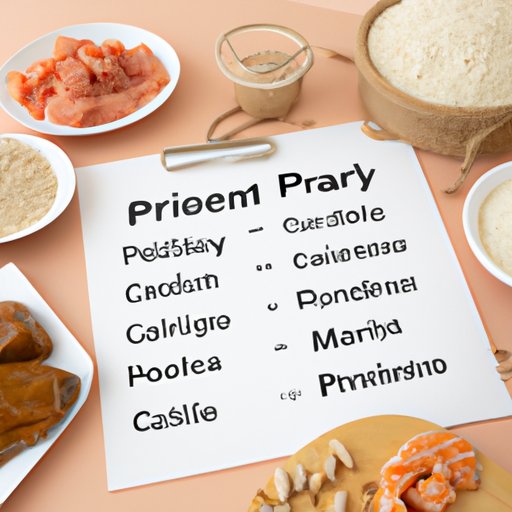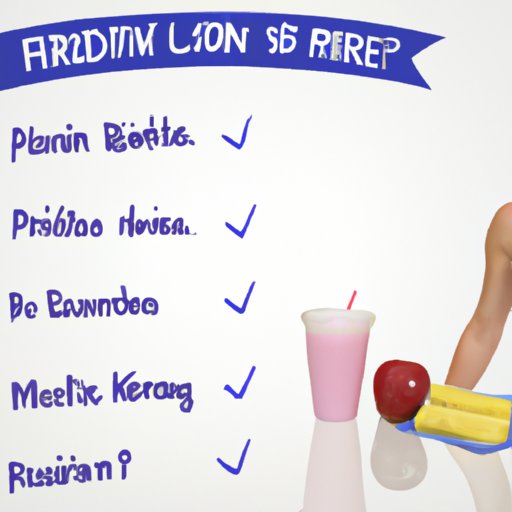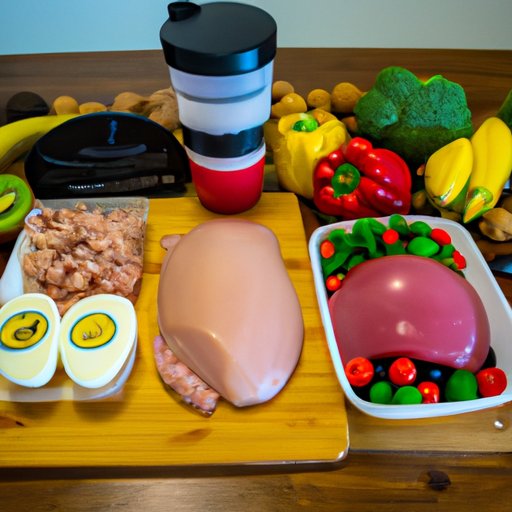
Introduction: What to Eat Before Working Out
Working out can be an excellent way to stay fit and healthy. But in order to maximize your workout performance, it’s important to fuel your body with the right nutrition. Eating the proper foods before a workout can provide you with the energy you need to stay energized throughout your routine, as well as help you recover afterwards. In this article, we’ll explore what to eat before working out and how to create a pre-workout nutrition plan that sets you up for success.
Eating a Balanced Meal before Working Out
When it comes to pre-workout nutrition, experts agree that eating a balanced meal is key. According to registered dietitian, Abby Langer, “A balanced meal should contain carbohydrates, proteins, and fats, plus other essential vitamins and minerals. This combination will provide you with sustained energy for your workout and support muscle health.”
Examples of a balanced meal include grilled chicken with sweet potato and roasted vegetables, or turkey and avocado sandwich on whole wheat bread with a side salad. These types of meals provide your body with important macronutrients and micronutrients to give you the energy you need during a workout.
Planning Ahead with Pre-Workout Snacks
If you don’t have time to sit down and eat a full meal before a workout, snacking on pre-workout snacks is a great alternative. Not only do snacks provide you with a quick source of energy, but they also help maintain blood sugar levels and boost your metabolism. Some examples of pre-workout snacks include a banana and peanut butter, Greek yogurt with berries, or a protein bar.
Registered dietitian, Marisa Moore, recommends that pre-workout snacks should be low in fat and fiber to avoid cramping and digestive issues. She states, “Aim for a snack that has two parts carbohydrates to one part protein. For instance, half of a turkey sandwich on whole grain bread with a piece of fruit.”

Maintaining Consistent Energy Levels with Nutrient Timing
Nutrient timing is another important factor to consider when planning pre-workout nutrition. According to research published in the journal Sports Medicine, “The goal of nutrient timing is to optimize performance by providing fuel when the body needs it most.” Nutrient timing involves consuming certain nutrients at specific times before, during, and after a workout.
For example, eating a snack high in carbohydrates 30 minutes before a workout can help ensure that your muscles have enough energy during exercise. On the other hand, consuming a snack high in protein shortly after a workout can help with muscle recovery and growth. The key is to plan ahead and make sure you’re getting the right nutrients at the right time.

Choosing Foods Rich in Protein and Complex Carbs
When it comes to pre-workout nutrition, it’s important to choose foods that are rich in both protein and complex carbohydrates. Protein helps build and repair muscles, while complex carbs provide energy and help regulate blood sugar levels. Examples of these types of foods include oatmeal with almond butter, quinoa with grilled chicken, or a smoothie made with Greek yogurt and berries.
According to sports nutritionist, Jackie Arnett Elnahar, “Choose a variety of lean proteins, complex carbohydrates, and healthy fats to get the most out of your pre-workout meal. A good rule of thumb is to aim for around 20 grams of protein and 30-50 grams of carbohydrates.”
Going for Fluids to Keep Hydrated
Staying hydrated is essential for optimal performance during a workout. It’s important to drink plenty of fluids before, during, and after exercise in order to prevent dehydration. Water is the best choice, but sports drinks and coconut water can also be beneficial. Avoid sugary drinks such as soda and juice, as these can cause a spike in blood sugar levels.
According to the American College of Sports Medicine, “You should aim to drink 17-20 ounces of fluid two hours before exercise and 7-10 ounces 10-15 minutes before starting. During exercise, you should drink 7-10 ounces every 10-20 minutes.”
Eating Fruits and Veggies for High-Fiber Carbohydrates
Fruits and vegetables are great sources of high-fiber carbohydrates, which provide sustained energy and help regulate blood sugar levels. Examples of high-fiber carbs include apples, bananas, carrots, sweet potatoes, and leafy greens. These types of foods should be incorporated into a pre-workout meal or snack.
According to registered dietitian, Molly Kimball, “Fruits and veggies are packed with essential vitamins, minerals, and antioxidants that help support overall health and wellness. Aim for at least two servings of fruits and/or vegetables before your workout.”
Avoiding Sugary Drinks and Processed Foods
Sugary drinks and processed foods should be avoided when planning pre-workout nutrition. These types of foods can cause a spike in blood sugar levels, leading to a crash in energy shortly afterwards. Additionally, processed foods tend to be high in unhealthy fats, sodium, and additives, which can be detrimental to your health.
Registered dietitian, Ashley Koff explains, “It’s best to avoid sugary drinks and processed foods before a workout. Instead, opt for whole, unprocessed foods that provide your body with the energy and nutrients it needs.”

Conclusion: What to Eat Before Working Out
Eating the right foods before a workout is essential for optimal performance. Aim for a balanced meal that contains proteins, carbohydrates, and healthy fats, or snack on pre-workout snacks that are low in fat and fiber. Additionally, be sure to incorporate nutrient timing, high-fiber carbohydrates, and plenty of fluids in order to maintain consistent energy levels. Finally, avoid sugary drinks and processed foods, as these can cause a crash in energy shortly afterwards.
By following these tips, you’ll be sure to have all the fuel you need to power through your workouts and reach your fitness goals. Remember, everyone’s needs are different, so it’s important to consult with a qualified healthcare professional if you have any questions or concerns.
(Note: Is this article not meeting your expectations? Do you have knowledge or insights to share? Unlock new opportunities and expand your reach by joining our authors team. Click Registration to join us and share your expertise with our readers.)
